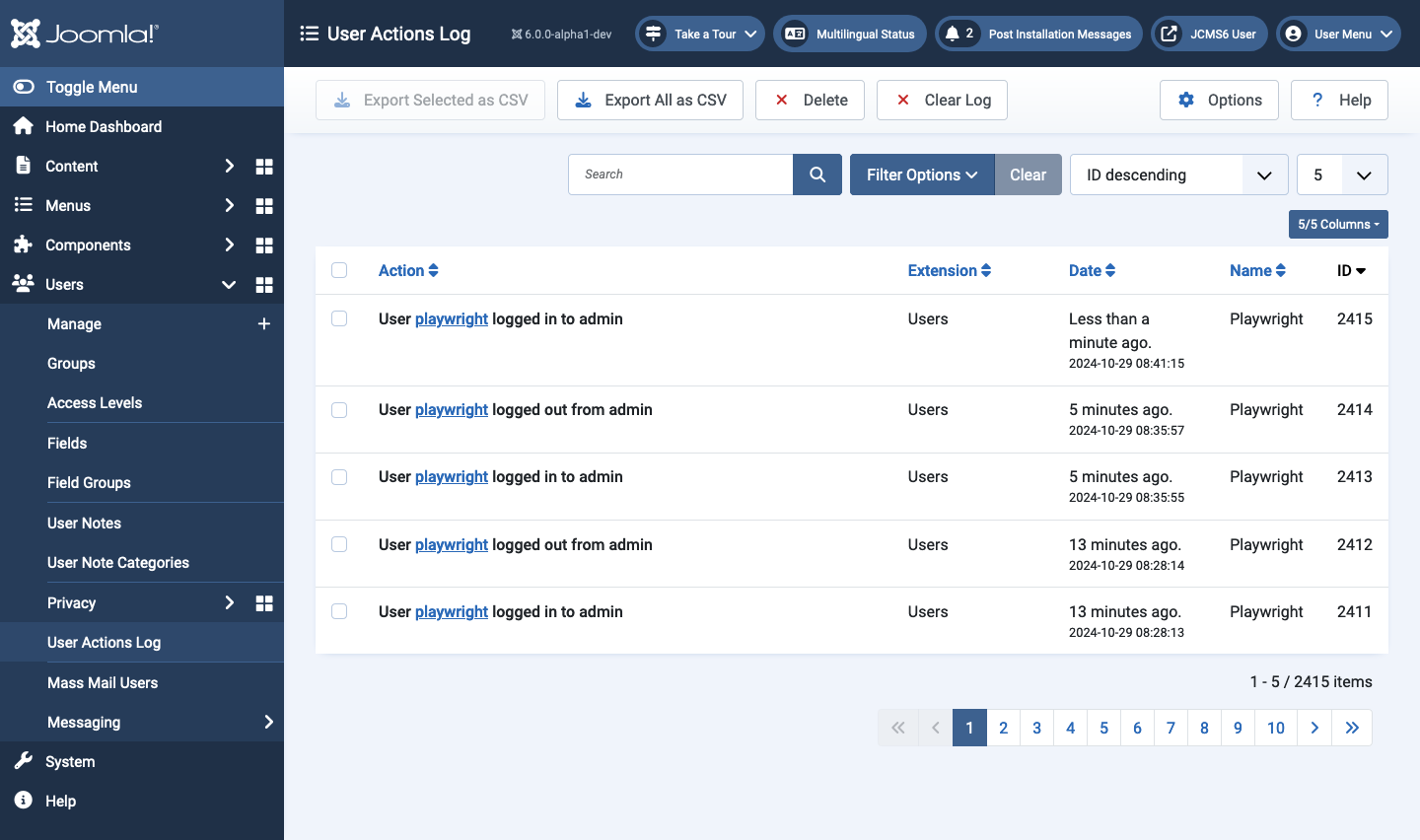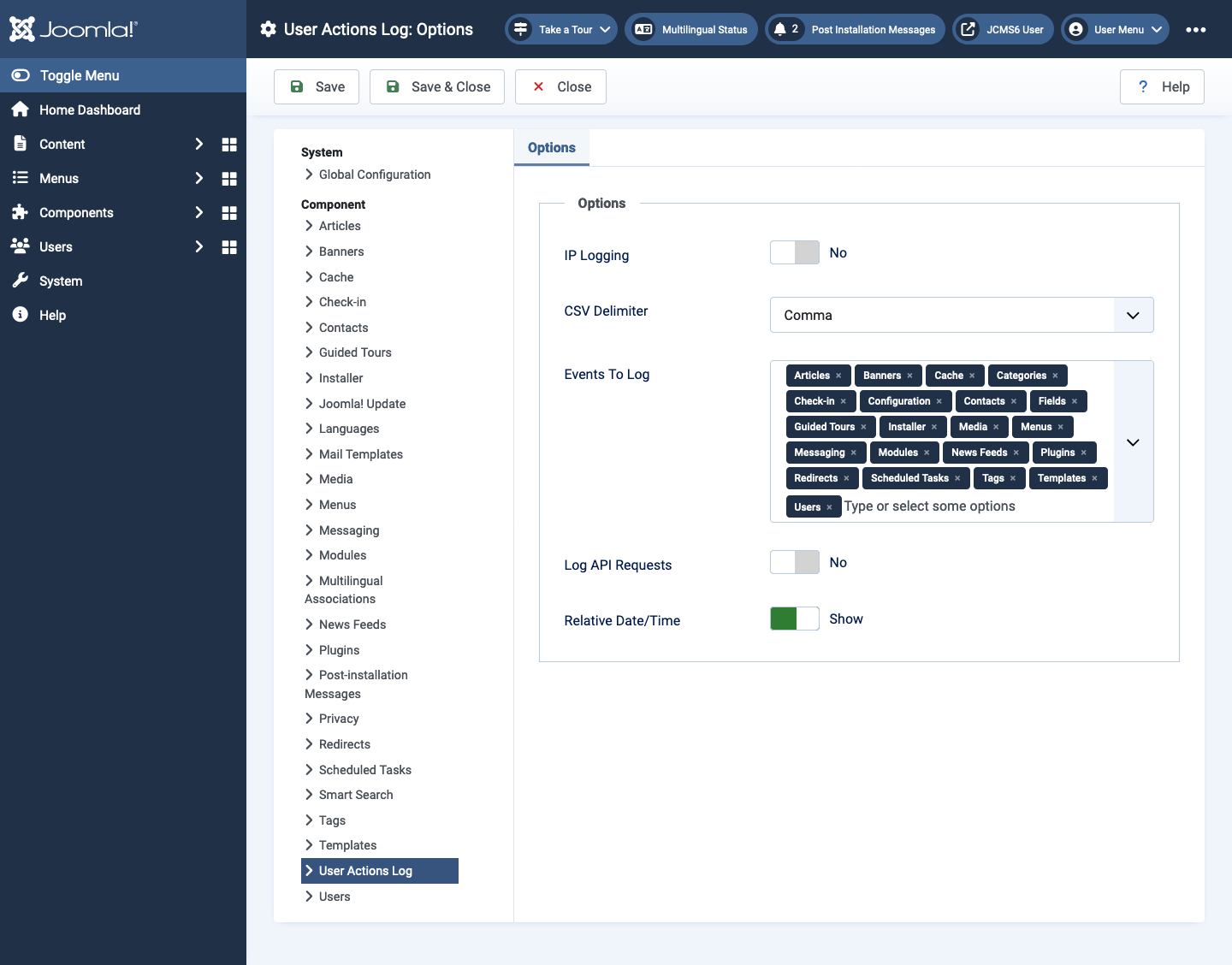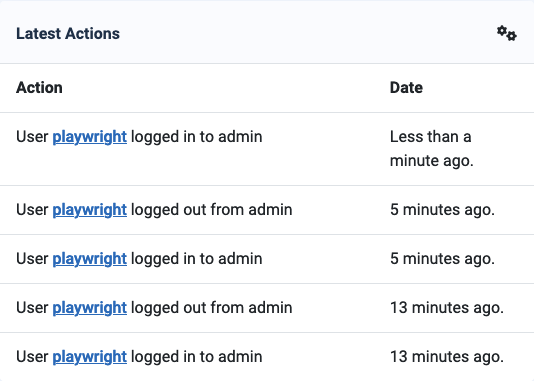Joomla User Manual
Manual Index
User Actions Log
Introduction
The User Actions Log component (com_actionlogs) provides an infrastructure to create an audit log of website activities. The actions that are logged can be fine tuned by the site administrator. Third party extensions are able to hook into the component to add custom messages or have the system process standard administrator actions.
Note: Only Super Users have access to the User Actions Log component.
User Actions Log
To view the the User Actions Log list:
- Select Users → User Actions Log from the Administrator menu.

From this page a Super User has a global overview of all user activities performed on a site.
- Export Selected as CSV: this button exports only the items selected in the visible list.
- Export All as CSV: this button exports all records. The filters are ignored.
- Delete: this button deletes the selected items.
- Clear Log: this button deletes all log entries.
- Options: a configuration form to set the logging options.
Options
The User Actions Log: Options form allows the Super User to select which events to log and whether to include IP addresses in the log data.

Plugins
The action logging system uses a number of plugins:
Action Log - Joomla
When enabled, this plugin records the users core actions, including such actions as login/logout, update article, add module. The plugin has no parameters,
System - User Actions Log
When enabled, this plugin defines the number of days after which the logs will be deleted. A value of zero will mean the logs are never automatically deleted.
Privacy - Action Logs
When enabled, this plugin exports the action log data for a user's privacy request.
Latest Actions Module
This module is displayed for Super Users only in the Home Dashboard.

How to hook an extension to the system
Please feel free to edit this section by improving or correcting it.
Component Installation Script
Add the extension to the table (#__action_logs_extensions) so that it
will appear in the configuration of User Action Logs.
$extension = 'com_mycomponent';
$db = Factory::getDbo();
$db->setQuery(' INSERT into #__action_logs_extensions (extension) VALUES ('.$db->Quote($extension).') ' );
try {
// If it fails, it will throw a RuntimeException
$result = $db->execute();
} catch (RuntimeException $e) {
Factory::getApplication()->enqueueMessage($e->getMessage());
return false;
}
Add the extension configuration to the table (#__action_log_config) so
that your actions data will be captured.
$logConf = new stdClass();
$logConf->id = 0;
$logConf->type_title = 'transaction';
$logConf->type_alias = $extension;
$logConf->id_holder = 'id';
$logConf->title_holder = 'trans_desc';
$logConf->table_name = '#__mycomponent_transaction';
$logConf->text_prefix = 'COM_MYCOMPONENT_TRANSACTION';
try {
// If it fails, it will throw a RuntimeException
// Insert the object into the table.
$result = Factory::getDbo()->insertObject('#__action_log_config', $logConf);
} catch (RuntimeException $e) {
Factory::getApplication()->enqueueMessage($e->getMessage());
return false;
}
Of course it would be best to perform some checking to ensure that the record doesn't already exist.
Component Helper
In this example, the component helper is used to perform the storing of actions.
/**
* Record transaction details in log record
* @param object $user Saves getting the current user again.
* @param int $tran_id The transaction id just created or updated
* @param int $id Passed id reference from the form to identify if new record
* @return boolean True
*/
public static function recordActionLog($user = null, $tran_id = 0, $id = 0)
{
// get the component details such as the id
$extension = MycomponentHelper::getExtensionDetails('com_mycomponent');
// get the transaction details for use in the log for easy reference
$tran = MycomponentHelper::getTransaction($tran_id);
$con_type = "transaction";
if ($id === 0) { $type = 'New '; } else { $type = 'Update '; }
$message = array();
$message['action'] = $con_type;
$message['type'] = $type . $tran->tran_type . ' - '.$tran->tran_desc . ' $' . $tran->tran_amount;
$message['id'] = $tran->id;
$message['title'] = $extension->name;
$message['extension_name'] = $extension->name;
$message['itemlink'] = "index.php?option=com_mycomponent&task=transaction.edit&id=".$tran->id;
$message['userid'] = $user->id;
$message['username'] = $user->username;
$message['accountlink'] = "index.php?option=com_users&task=user.edit&id=".$user->id;
$messages = array($message);
$messageLanguageKey = Text::_('COM_MYCOMPONENT_TRANSACTION_LINK');
$context = $extension->name.'.'.$con_type;
$fmodel = MycomponentHelper::getForeignModel('Actionlog', 'ActionlogsModel');
$fmodel->addLog($messages, $messageLanguageKey, $context, $user->id);
return true;
}
/**
* Get the Model from another component for use
* @param string $name The model name. Optional. Default to my own for safety.
* @param string $prefix The class prefix. Optional
* @param array $config Configuration array for model. Optional
* @return object The model
*/
public function getForeignModel($name = 'Transaction', $prefix = 'MycomponentModel', $config = array('ignore_request' => true))
{
\Joomla\CMS\MVC\Model\ItemModel::addIncludePath(JPATH_ADMINISTRATOR . '/components/com_actionlogs/models', 'ActionlogsModelActionlog');
$fmodel = \Joomla\CMS\MVC\Model\ItemModel::getInstance($name, $prefix, $config);
return $fmodel;
}
Front End Transaction Form
Now that the foundations are set, we just need to trigger the process.
We're capturing information about a transaction that is created or
update and we have a model called transactionform.php. It is in the
Save method that we want to capture a log.
// So the code above this point checks and does what it should do and then after the successful save of the record, we check for the parameter setting to see if logging is required, we pass key elements to recordActionLog.
$table = $this->getTable();
if ($table->save($data) === true) {
/* ---------------------------------------------------------------- */
// trigger transaction log if required
$act_log = $params->get('act_log', 0);
if ($act_log && $table->id) {
// gather information and log in a new action log record
MycomponentHelper::recordActionLog($user, $table->id, $data['id']);
}
/* ---------------------------------------------------------------- */
return $table->id;
} else {
return false;
}
Language File
Finally, to help with the Action Log Listing in the admin side of Joomla, we want to set some key elements of data to be displayed in the language file en-GB/com_mycomponent.ini.
COM_MYCOMPONENT_TRANSACTION_LINK="User {username} created a transaction ( {type} )"